RADA AKBAR
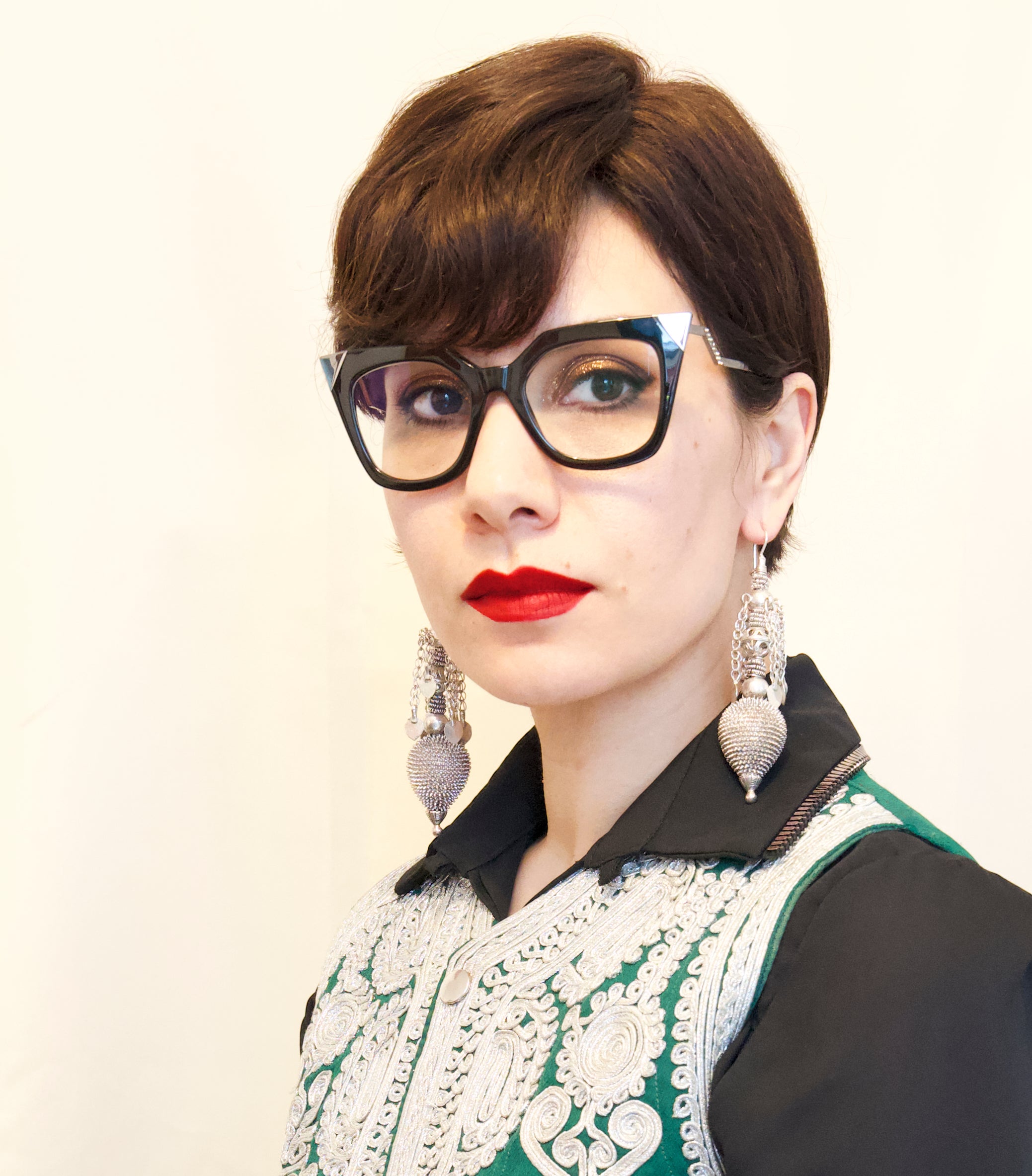
This famous Afghan saying eloquently expresses a duality in human nature—our remarkable resilience in facing adversity, yet our vulnerability to spiritual and emotional wounds. It speaks to the strength we find in survival and the pain we endure in the process.
I often heard this saying growing up, especially from my mother and the women in my family, whose lives truly reflected its meaning. Years of relentless war have taught every family the harsh realities of loss, displacement, fleeing from one conflict to another, forced to start from scratch, sometimes repeatedly. When the Taliban took over Afghanistan in August 2021, many Afghans had to flee, leaving behind homes, loved ones, dreams, and sometimes even their identities. Packing one’s boxes—putting dreams, hopes, and struggles in boxes smaller than before—requires immense resilience.
For artists who had to flee, these losses expanded to include their art, incomplete art pieces, and even their ideas.
Since the Taliban takeover, Afghan women have organized civic resistance. They have taught us creative ways to resist. Despite the egregious new laws and policies sexualizing and objectifying women’s voices, women continue to sing and recite poetry, both inside the country and throughout the diaspora.
Women artists, much like the women protesters who marched with the slogan “bread, work, freedom,” play a vital role in shaping this grassroots movement. As we mark the 16 Days of Activism against Gender-based Violence, an annual global campaign ending on December 10, Human Rights Day, we honor Afghan women artists in exile who protest through their work, who voice their beliefs through the art they create with patience, creativity, and passion.
Today, we are featuring Rada Akbar, a conceptual artist, and Fatima Wojohat, who creates art with chalk and digitally. Both artists, who create despite being uprooted from their homeland, have messages of hope for girls and women inside Afghanistan, whose lives may feel cut off from art and the creative world.

The artworks shared here, created with plaster bas relief, acrylic paint, and gold leaf, come from her series “Infinite Power.” This art series pays tribute to the ancient Persian miniature paintings rooted in the historical traditions of Afghanistan, while also placing a spotlight on the strength, resilience, and individuality of Afghan women, Rada said. By reimagining female figures from these artworks, the series reinterprets them as enduring symbols of Afghan women throughout history—custodians of culture and drivers of change.
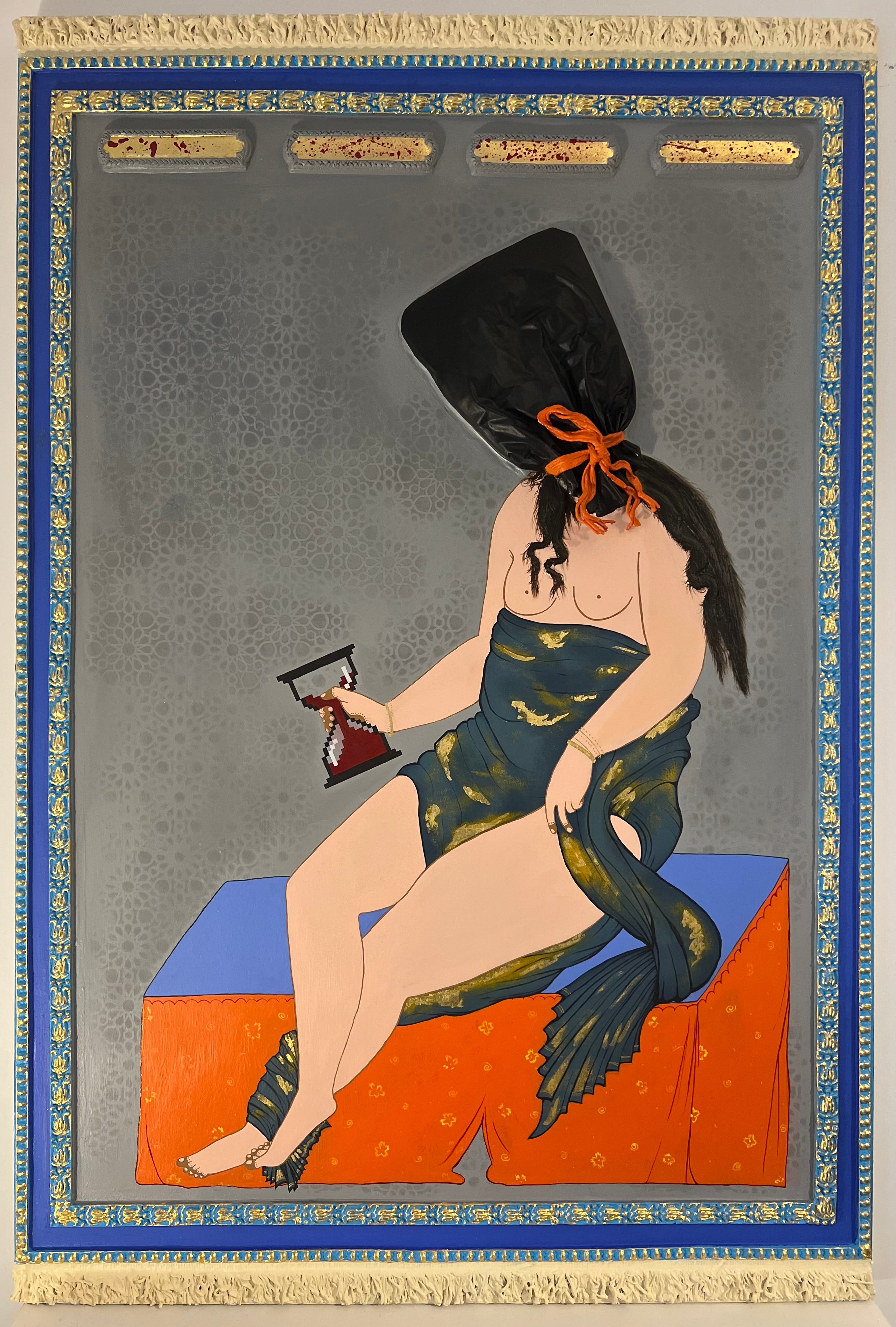
Blending traditional motifs with modern patterns and elements, the series explores Afghanistan’s current realities, reflecting both the profound cultural and historical losses and the unwavering spirit of its women, according to Rada. Carpets, chosen as the artistic medium, are culturally significant in Afghanistan, but they also represent the harsh realities faced by many Afghan women today. Once professionals who lost their jobs and livelihoods under the Taliban, many women have been forced into the grueling industry of carpet weaving to survive.
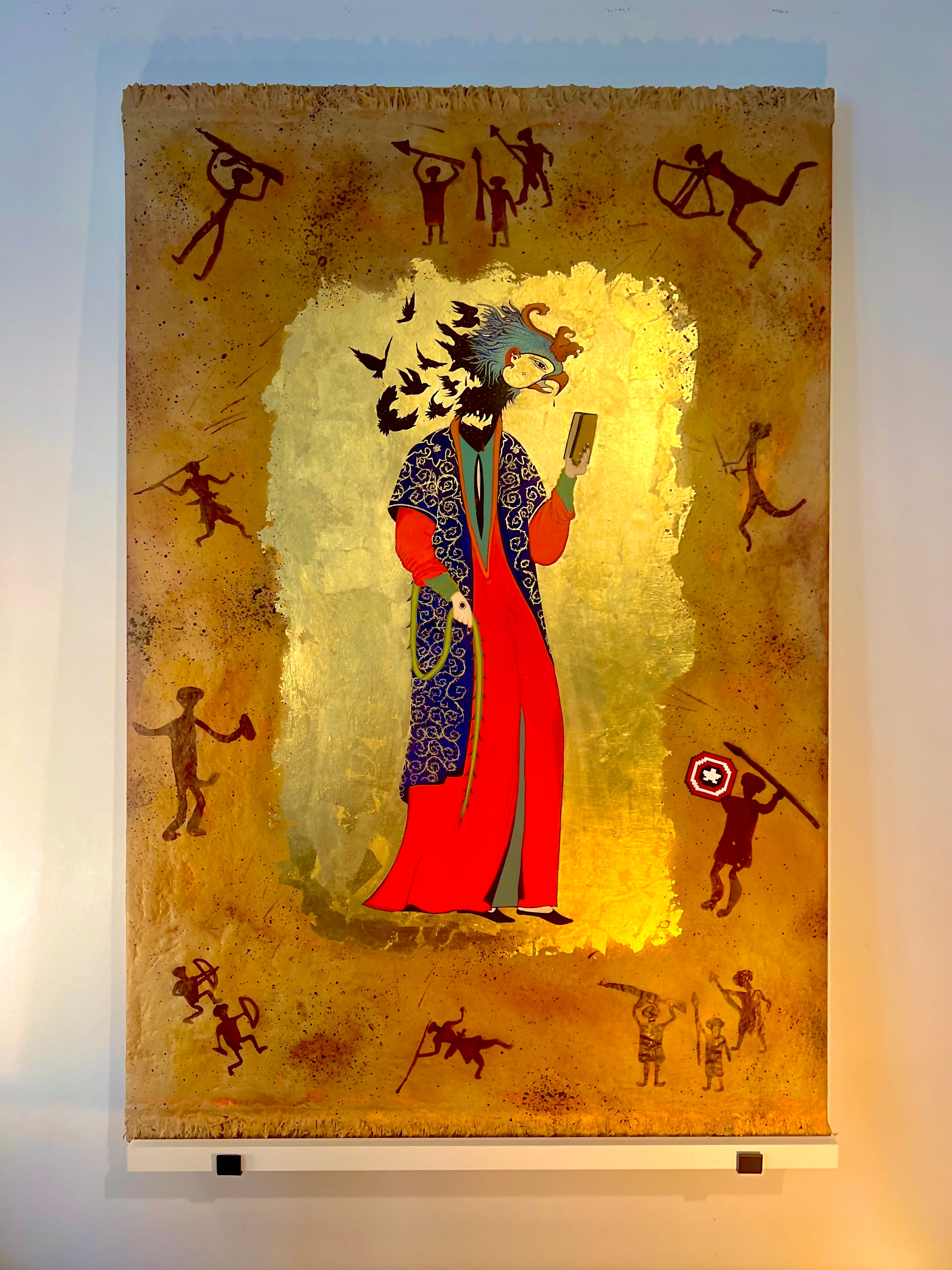
By using carpets as the medium, this series seeks to amplify the voices of today’s carpet weavers, revealing the struggles and resilience of Afghan women. The series also traces Afghan women’s journey through history, preserving their cultural heritage while honoring their courage and fight for rights. The carpets become a canvas for dialogue—testament to the integral role women have played in shaping Afghanistan’s cultural identity and a call to action to support and empower women in their pursuit of dignity, art, and self-expression, Rada said.
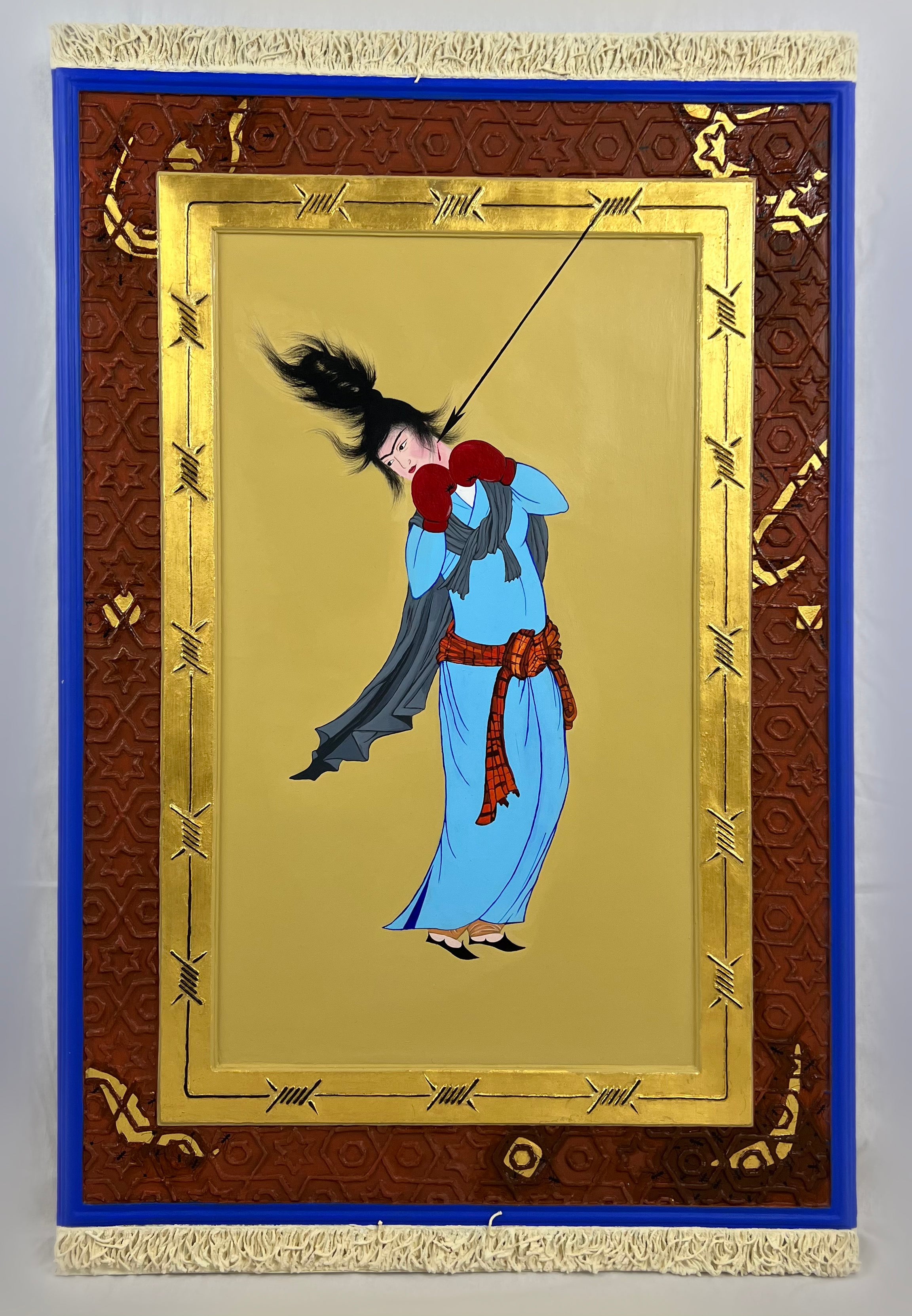
Rada Akbar’s message for girls inside Afghanistan:
“Art begins with imagination, and that imagination is where your dreams come to life. It’s the canvas where creativity knows no limits, allowing you to rise above the boundaries placed upon you. To the brave girls and women in Afghanistan who long to pursue art and find freedom through it, know that your imagination is a powerful force—one that no one can ever take away from you. Even in the face of harsh restrictions, your creativity can find a way to bloom, whether through whispered words, hidden sketches, or simply by daring to imagine a world where you are free to express your soul.
Hold onto that vision with all your heart, because art has the power to shatter even the strongest chains. Your dreams are not just valid—they are vital, and your voice carries weight, even in the silence. The path before you may be filled with obstacles, but your spirit, your creativity, and your resilience are part of something much bigger—a movement that will one day bring change. Stay strong, keep dreaming, and know that every time you create, you are claiming a piece of freedom that no one can ever take from you.”
I know Rada Akbar, 36, from Kabul from 2013, a time when we could be proud of our country’s path and had much hope for the future. Rada’s compelling artwork, created with textiles, paint, and other media, discussed women’s bodily autonomy and women’s untold stories.
To counter the perception of Afghan women as victims, while still living in Afghanistan in 2019, Rada began the “Abarzanan” (Superwomen in Farsi) project, designing dresses honoring powerful Afghan women in history whose contributions were not celebrated enough, crafting each dress to reflect the life and work of a particular superwoman.
Rada held two exhibitions of this show and was preparing for a third, but by then the Taliban were gaining ground and the deteriorating security situation made it impossible. Instead, on March 8, 2021, she boldly held an exhibition honoring Afghans killed by the Taliban and other extremists, giving a speech in a room full of empty chairs:
I have been told the world is tired of us, tired of Afghanistan and its bloodshed. But can the world imagine how tired we are? Does the world understand how helpless we feel when decisions about our lives, our future, and our youth are made in Doha and Washington, D.C.? Do they know that we walk on seas of blood every day? Do they understand the depth and scale of the scars on our hearts and souls? Do they know that death is breathing down our necks? Does anyone care?
Rada fled Afghanistan on 18 August 2021, two days after the Taliban returned to power.
Today, three years later, women and girls are virtually erased from Afghanistan’s society; day by day, the Taliban actively make them disappear. Female voices have been explicitly banned, accused of leading men to vice, and relentless attacks on women’s bodies continue.
Now in exile in Paris, Rada, works as an artist full time, creating meaning through her art, and striving to make the world understand the challenges Afghan women and girls face and the resilience they embody.
“Art has the power to capture and preserve history, especially the emotions and struggles that define this moment,” said Rada, adding that she feels a profound responsibility for her work to honor the courage and resistance of Afghan women. “Afghan women are not just living through history; they are making it with their resilience.”
Rada’s work serves as both a tribute and a record, ensuring that the stories of Afghan women are remembered by future generations. “By documenting their fight, I hope to inspire the next generation of Afghan girls, showing them the beauty, culture, and life that their foremothers fought to protect.” In this way, “art becomes a bridge between the past and the future, honoring the spirit of Afghan women and empowering those who will carry on their legacy.”

Fatima often uses her artwork to respond to the oppressive conditions in Afghanistan, particularly the challenges faced by women and girls. In one piece, a young girl in a vibrant red and gold dress is depicted playing hopscotch, with three armed men aiming guns at her head. The hopscotch squares are labelled “school,” “work,” and “higher education.” Her sneakered foot lands on the square marked “dreams,’” but the next square, agonizingly out of reach, is labelled “freedom.”
In another piece, a girl plays a rifle as if it were a violin, transforming an instrument of violence into one of expression and resilience. A white mask obscures her eyes, inscribed with the word “Iqra,” meaning “read” or “recite” in Arabic, symbolizing silenced potential and the struggle for education.
“Briefly, they reflect my deep concern for the erasure of freedoms and opportunities for Afghan women and girls. Through my art, I strive to amplify their voices and stories, presenting their dreams and struggles to the world.

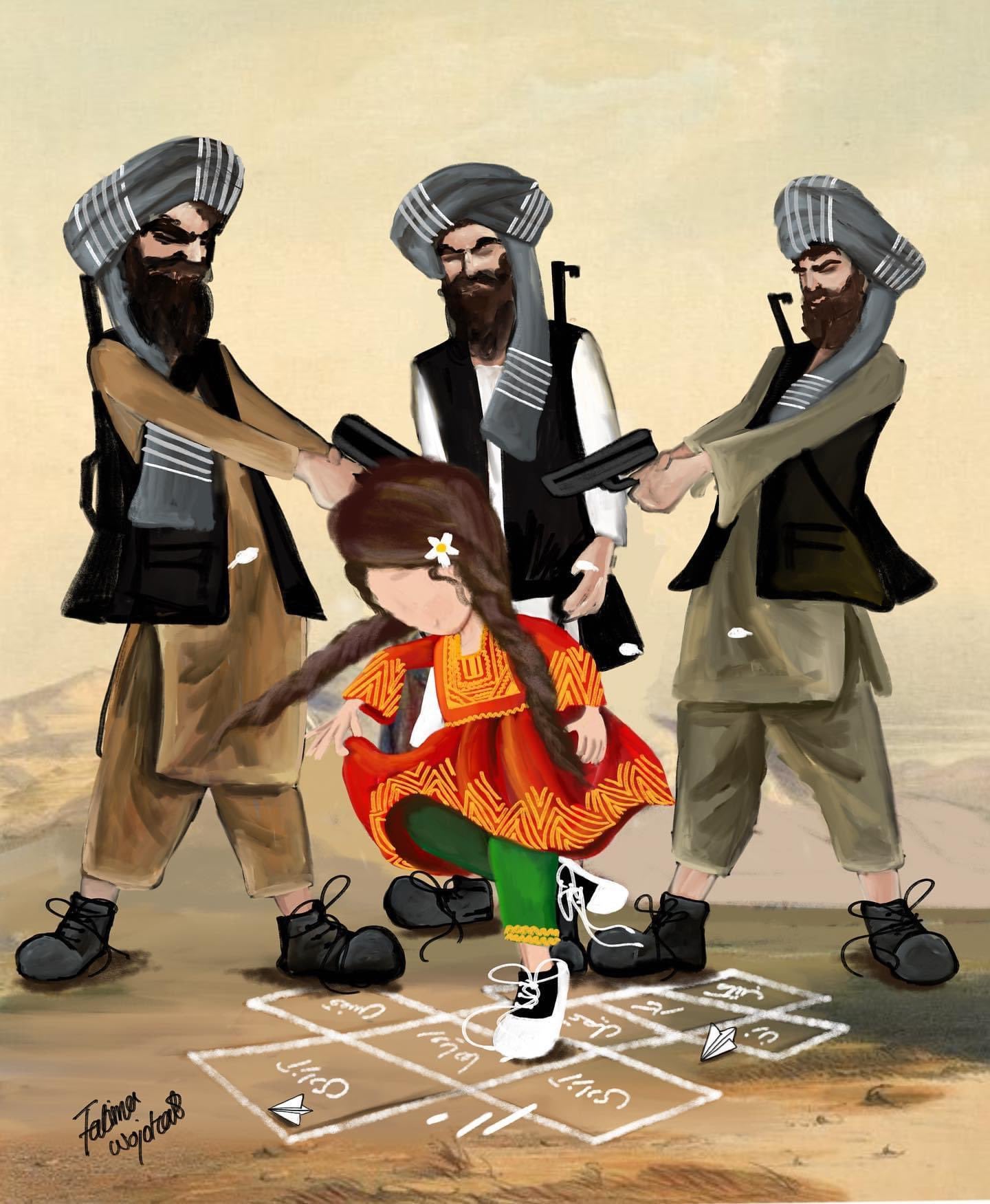
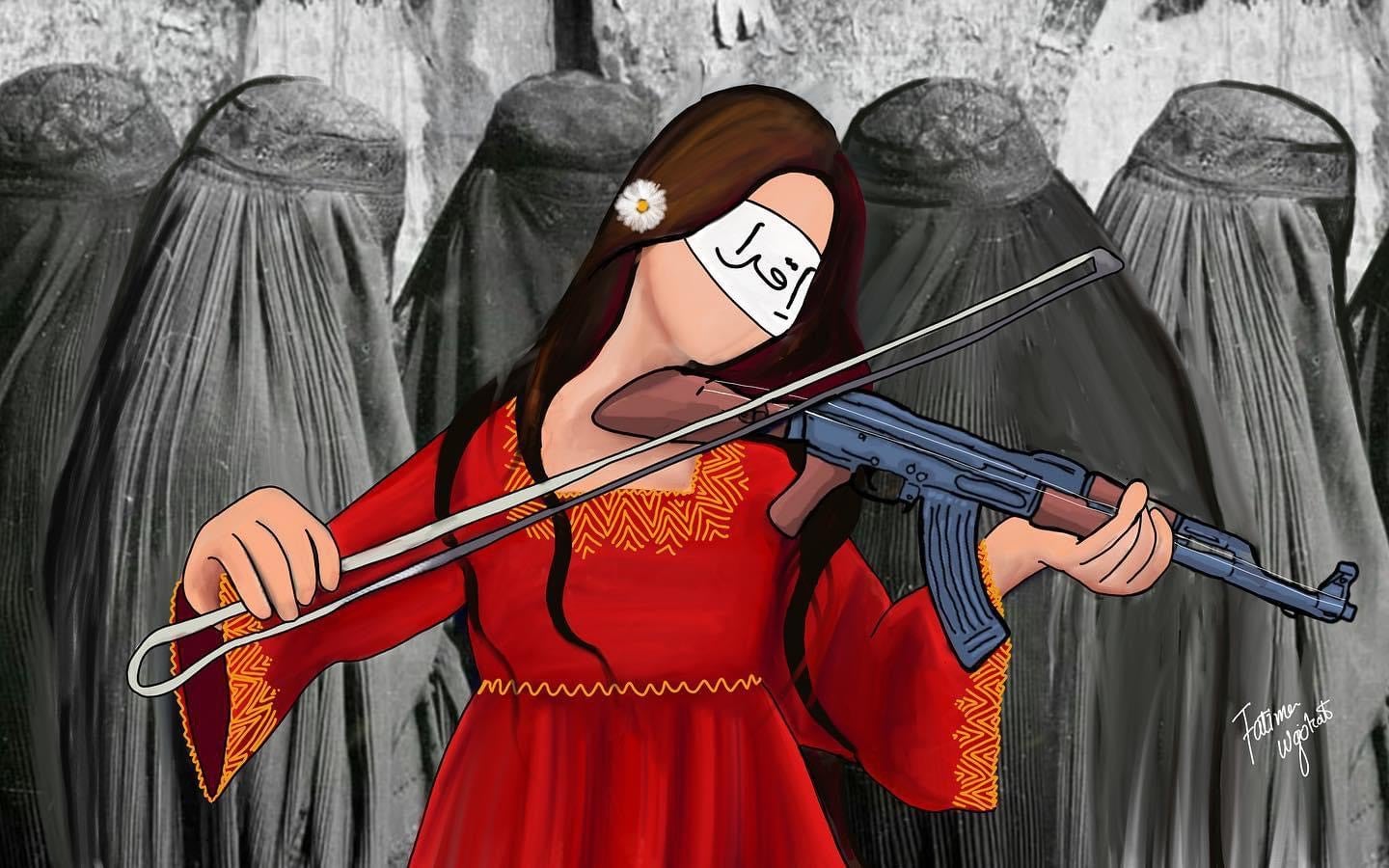
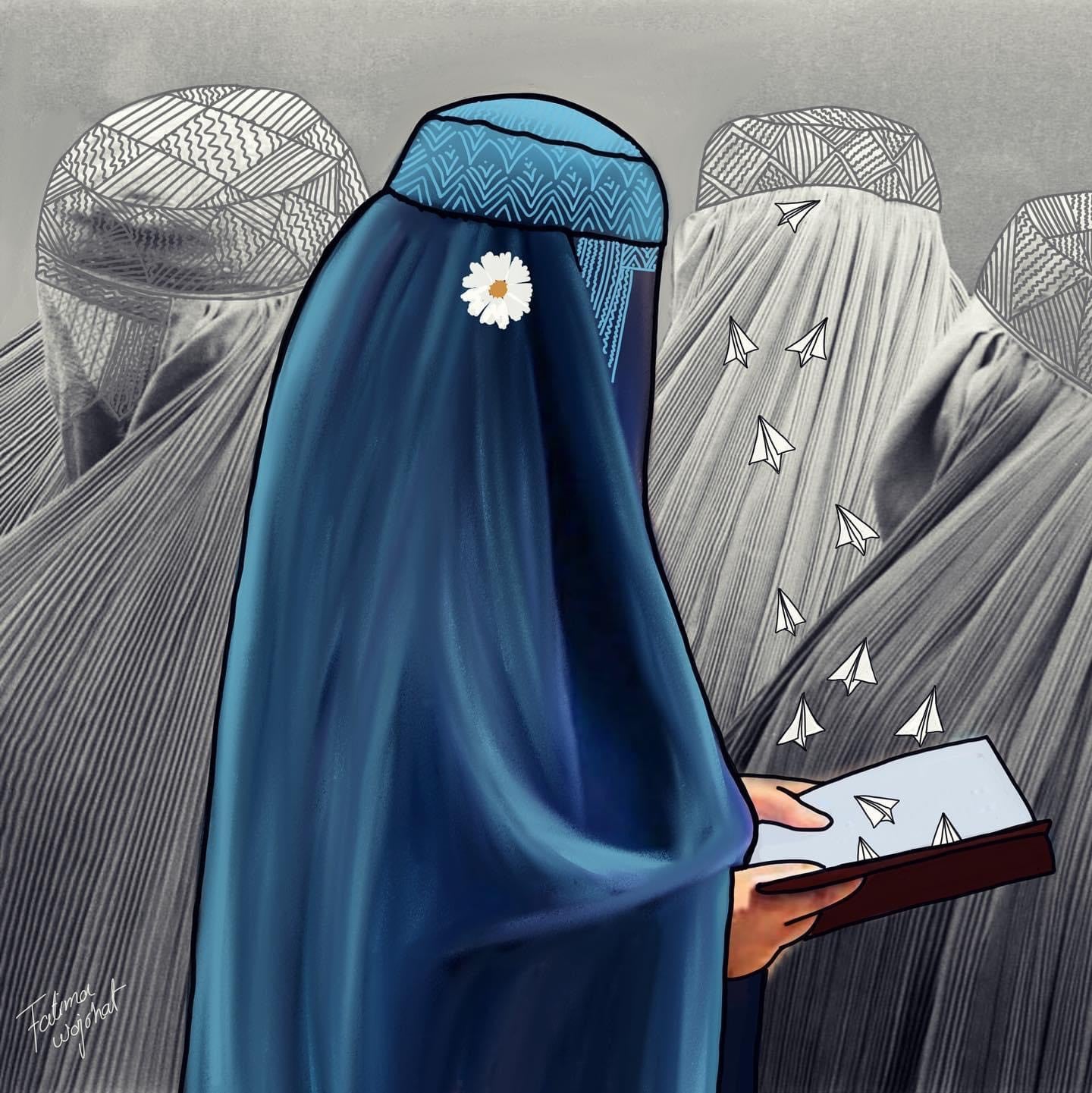
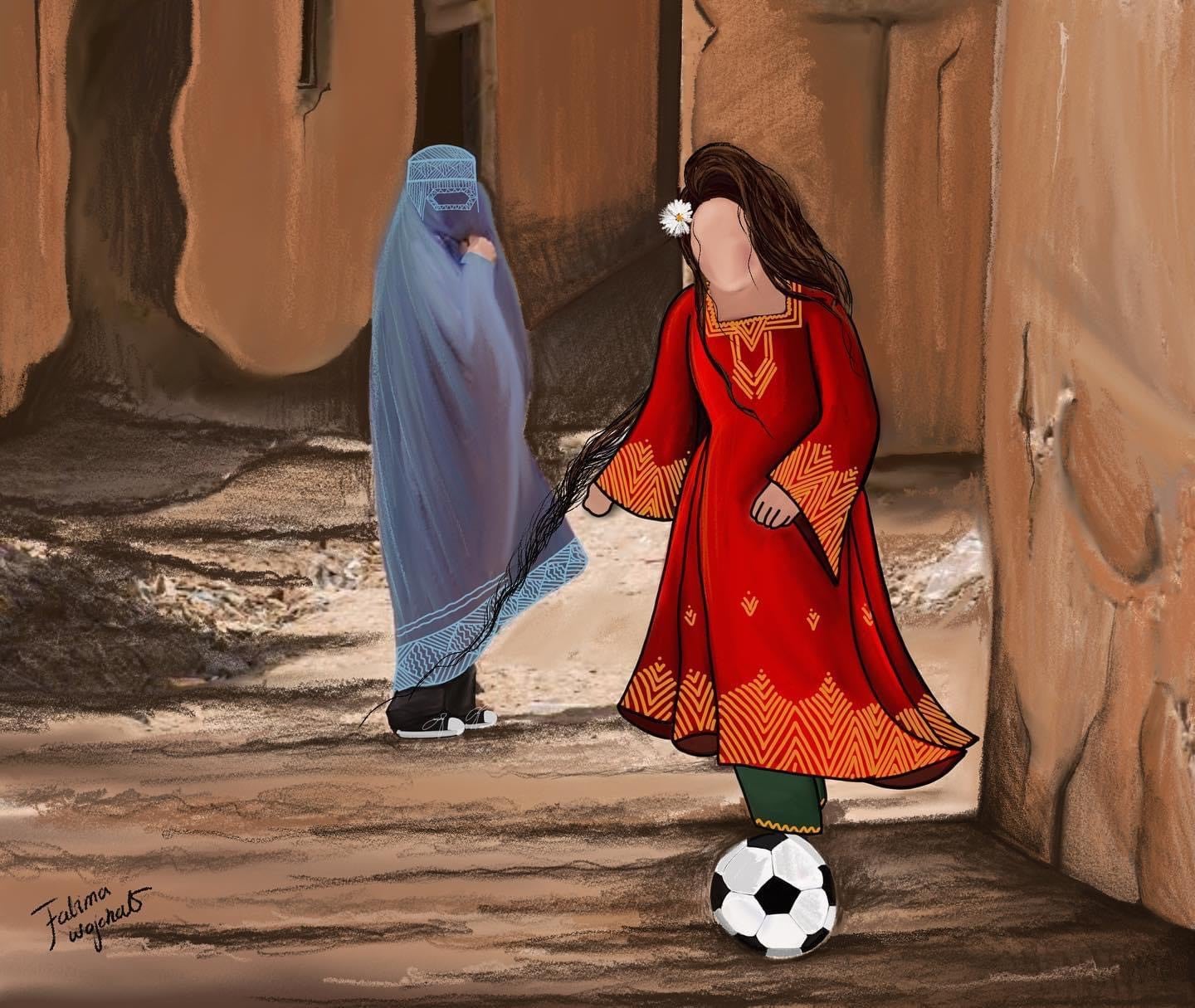
Fatima Wojohat’s message for girls inside Afghanistan:
“As an Afghan girl and Afghan Artist who lived in Afghanistan under the Taliban government, art was the only weapon that I could use to stand against the Taliban, I wanted to share the voices and stories of thousands of girls' dreams and my dreams.
My message for my brave Afghan girls is that, no matter how dark is the cage and no matter how big the monster is, follow the little light shadow that you can see from your cage, sing like a bird in a cage, your voice and your art is your power, and our Dreams are bigger and stronger than darkness.”
Fatima was only 19 when the Taliban took over Afghanistan in 2021, but she was already creating her art. Through an art and activism organization in Afghanistan, she and others painted murals she hoped would inspire women and girls across Kabul’s blast walls, barriers designed to protect buildings from nearby explosions.
I came across Fatima’s work on Instagram, where she tirelessly advocates for Afghan women and girls’ rights, campaigning for the recognition of gender apartheid as a crime against humanity through her art. Her work has been widely shared by activists and other artists.
Growing up in Kabul, Fatima had more freedom than other young girls may have had. As a child, her mother dressed her as a boy, giving her daughter the opportunity to ride a bike and play freely. After the Taliban toppled Afghanistan’s government, Fatima could only create art on her phone, her freedom gone.
In 2023, she came to the United States to become an art student at Dean College in the state of Massachusetts, through Harvard University’s Scholars at Risk program, which helps artists, writers, and others escape persecution. Now 22 years old, Fatima views art as a powerful way to tell a story, and she believes her art can inform the world about women’s stories inside Afghanistan. “It is a voice for Afghan Women's Resistance, and it is a weapon against injustice, and it can be a key to achieving and sharing our dreams,” she says.
In Afghanistan today, girls are banned from secondary and higher education, their access to the art world and opportunities to learn about various art forms are strictly limited.
Fatima’s work depicts resilience and vulnerability. Her paintings are powerful and poignant responses to the Taliban’s attack on women and girls. Many of Fatima’s artworks, created in exile in the United States, powerfully illustrate the ongoing struggle between the Taliban leaders, who fear girls and women’s education, and the girls who dare to dream big, whose dreams haunt the Taliban. Through her pieces, the themes of education, the fight for autonomy, and the quest for freedom emerge, revealing girls’ and women’s resilience and aspirations in the face of ruthless oppression by the Taliban.
***
Fatima, Rada, and other Afghan women artists continually use their art as a powerful medium for expressing dissent and resistance, highlighting injustices, expressing people’s power, and inspiring change. Despite being far from home and facing numerous challenges, their daily struggles, solidarity, and strength truly embody the famous saying: “A human being is more delicate than a flower and tougher than a rock.” Though vulnerable to change and difficulties, their resilience shines through, enriching a living movement and leaving a lasting legacy.